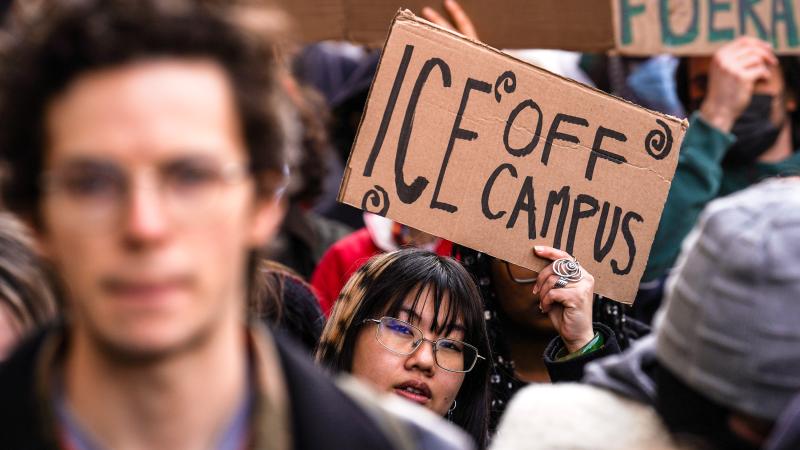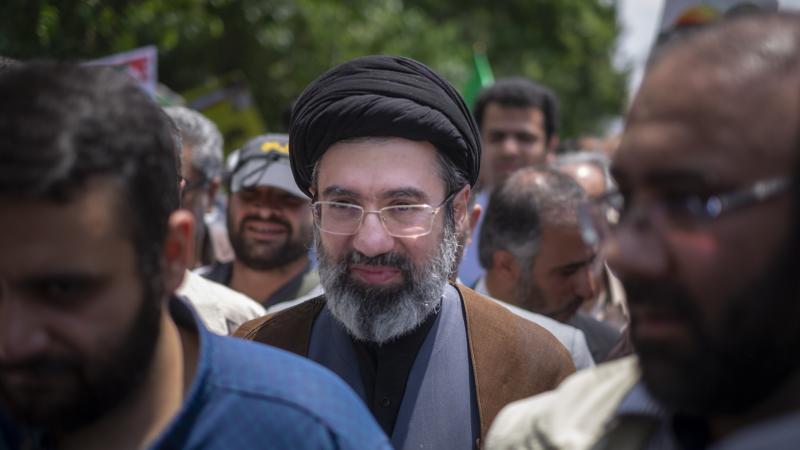Judge approves antisemitism 'deliberate indifference' lawsuit against Harvard, second since summer
Ivy League school's claim to be "unaware" of medical student's harassment is "wholly inconsistent" with her claims of repeatedly reaching out and even trying to file a complaint but being denied anonymity, Clinton nominee says.
Already reeling from plummeting donations and admission applications stemming from its ambivalent response to the Oct. 7, 2023, terrorist attacks by Hamas against Israeli civilians, outrage from banning pro-Palestine "study-in" faculty from a campus library and now a second Trump administration, Harvard also can't catch a break from the federal courts.
For the second time in three months, U.S. District Judge Richard Stearns, nominated by President Clinton, greenlit a lawsuit alleging the Ivy League school allowed unchecked antisemitism against students, while dismissing retaliation and "direct discrimination" claims.
The Brandeis Center for Human Rights Under Law and Jewish Americans for Fairness in Education brought suit on behalf of their members and seek to represent a class of Jewish and Israeli students.
"This is a huge win for Jewish students, both at Harvard and across the country," with Stearns paving the way for legal discovery that further opens Harvard to scrutiny, Brandeis Center chairman Kenneth Marcus, who served as the director of the Education Department's Office for Civil Rights in the first Trump administration, said in a press release.
The Jewish civil rights group emphasized that Stearns preserved its "most important claim," that Harvard didn't address "cruel anti-Semitic bullying, harassment, and discrimination" before and after the Oct. 7 attacks.
Echoing a House Education Committee report last month, Stearns "flat out rejected Harvard’s disgraceful and continued attempts to gaslight Jewish students," Marcus said. "Students have been discriminated against, threatened and assaulted – both by students and professors."
Harvard spokesperson Jason Newton wrote in an email, which emphasized the two dismissed claims, that the university "has and will continue to take concrete steps to address the root causes of antisemitism on campus and protect our Jewish and Israeli students, ensuring they may pursue their education free from harassment and discrimination."
He also wrote: "Harvard is confident that once the facts in this case are made clear, it will be evident that Harvard has taken significant steps to strengthen and clarify our policies and procedures, as well as engage our community around civil dialogue to bridge divides."
The ongoing litigation appears to show the resignation in January of Harvard President Claudine Gay – buried by plagiarism allegations in the wake of her disastrous congressional testimony on the school's treatment of genocidal campus slogans – only whetted the appetite of Harvard's critics.
The Biden administration's Education Department opened an investigation into allegations of antisemitism at Harvard nearly a year ago, burt the status of the probe is unclear. The agency's Office for Civil Rights' only open Title VI investigation on Harvard University for "National Origin Discrimination Involving Religion" – which often refers to antisemitism – was begun on Feb. 6.
The plaintiffs alleged Harvard "failed to take any remedial action" against Kennedy School professor Marshall Ganz despite accepting a fact-finder's report that Ganz created a "hostile learning environment" by pressuring their members to drop a project on their Israeli and Jewish identity and letting other students denounce Israel unrebutted in the spring 2023 class.
While anti-Israel protesters at a campus "die-in" were criminally charged for assaulting a Brandeis Center and JAFE member who filmed them as he passed through to business class, Harvard resisted its own "remedial action" before assigning outside counsel to investigate under congressional pressure, Stearns summarized from the allegations.
Even then counsel didn't start investigating for three months, until "the night before Congress published a letter to Harvard demanding action," and still doesn't appear to have reached out to the perpetrators, the plaintiffs alleged.
Harvard officials ignored pleas from a plaintiffs' member attending Harvard Medical School to respond to protests she had to pass that celebrated the terrorist attack, and "she stopped commuting to her lab and instead began to work almost exclusively from her apartment, " the Brandies center and the Jewish Americans for Fairness in Education allege in their 72-page, May 22 complaint.
She gave up filing a formal complaint with the diversity, equity and inclusion office, fearing retaliation because "Harvard refused to let her proceed anonymously," Stearns wrote.
The plaintiffs alleged several other incidents since the congressional investigation, including glorification of violence against Jews on Sidechat, "an anonymous social network accessible only to those with Harvard emails," and "several student groups and one faculty group" posting an antisemitic cartoon on their social media accounts, with no Harvard response.
"Although Harvard disputes whether members’ injuries are ongoing … the Complaint paints a picture of a campus environment that, allegedly to this day, is filled with antisemitic and anti-Israeli rhetoric that Harvard refuses to sanction or even address," Stearns wrote, granting associational standing and citing his prior ruling in the Students Against Antisemitism suit.
Also citing his July ruling in the "very similar" class-action lawsuit by StandWithUs against MIT, Stearns wrote that deliberate indifference means "affirmatively choosing to do the wrong thing, or doing nothing, despite knowing what the law requires."
Harvard only challenged the last of the five-part test, that its response to antisemitism was "clearly unreasonable in light of the known circumstances," but its claim to be "unaware" of the medical student's harassment is "wholly inconsistent with" her claims of repeatedly reaching out and even trying to file a complaint, Stearns wrote.
The school's insistence that it "affirmatively launched an outside investigation into the alleged harassment" of the Kennedy School and business school members "misconstrues the nature of plaintiffs’ claims" – its failure to take "any remedial action" for a year on one and "meaningfully advance the other" for months, the judge said.
If just launching an investigation "without any further follow-through" could disprove deliberate indifference, that would "prioritize form over function," Stearns wrote.
While the plaintiffs claim "Harvard invented a policy to delay disciplinary action pending resolution of criminal proceedings" and "obfuscated its response to the discrimination finding to avoid disciplining Professor Ganz," they can't show Harvard "did not treat non-Jewish and non-Israeli comparators similarly" for the direct-discrimination claim, he ruled.
They also didn't make a claim "to this effect" that "Ganz’s material adverse actions can nonetheless be attributed to the university under a deliberate indifference theory," the judge said, also dismissing the retaliation claim.
The Facts Inside Our Reporter's Notebook
Links
- plummeting donations
- admission applications
- outrage from banning pro-Palestine "study-in" faculty from a campus library
- second time in three months
- press release
- House Education Committee report
- January resignation of President Claudine Gay
- disastrous congressional testimony
- exit polls showing Queens-born Trump made historic gains
- Department of Education opened an investigation
- Office for Civil Rights' only open Title VI investigation
- his prior ruling
- July ruling
















